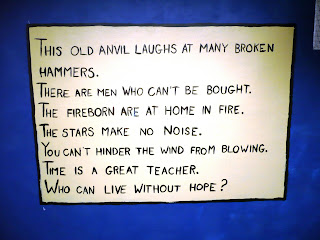The events in this post actually occurred 2 weeks ago. I had 5 exams last week and that was just not fun.
Anyway, as part of the Pediatrics Interest Group (PIG), I participated in the Obesity Presentation outreach project to high school students. Along with my fellow M1, Megan, I went to a high school in a nearby city to give an obesity presentation to a health class of 10th graders. They had just started the nutrition unit, so our timing was perfect.
We arrived earlier than we thought, and we just talked with the teacher a bit in her prep hour. She's a HUGE health nut (which is great, since she teaches health). She talked about how she ran a marathon over the weekend, and about the perceptions her students have on diet and exercise and weight loss, and how doctors barely talk about nutrition (which is totally true - medical education SUCKS in that regard) and ways to prevent chronic illnesses. She remarked how she saw a major article a month or so ago on cancer and they had all these doctors talk about treatments, and interventions, and all that. But not once was prevention mentioned in the article and how nutrition and lifestyle factors into cancer risk.
Then the 10th graders started to filter in. Wow, I totally forgot how young they are. o_O I mean, was it really that long ago that I was sitting in a similar class? Beforehand the teacher told us how this class was a class full of kids who're in the honors/AP track and all really intelligent. That definitely made our work easier. We had a great time with them and they were really responsive and interactive. I loved seeing the wheels in their heads turn as we asked open-ended questions. What REALLY surprised me was, when we asked "How many of you know someone with diabetes?" they all rose their hands. Wow, back in my day (I can't believe I just typed this), I knew of maybe 1-2 people with diabetes.
We actually finished the presentation 5-7 minutes early, so we just opened it up to any questions they had. One kid asked me, "So what do you want to do after med school?" I looked at Megan and was like, "Uh . . . become a doctor?" He continued with, "Do you want to keep doing stuff like this? Coming into classrooms and teaching about health?" That surprised me a little. And you know what, I responded with how I would actually love to do this a couple times a year as a doctor and really teach/engage kids in healthy lifestyles. I then told them really briefly about how I taught undergrad genetics for a semester - I think some of their eyes bulged out of their orbits at that, lol. Yeah, overall a great bunch of kids.
As they left, Megan and I prepped to give the next presentation, which was the hour immediately after. This next class couldn't have been more different. This was a class of special ed students - some who were autistic, some with Down's syndrome - all with some degree of mental retardation. There were 3 aides in the room to help them, which was good.
We altered how we presented the material and took more time to explain things, simplify things, and just go at a slower pace for them. For the most part I think almost all of them were able to grasp what we were telling them. And collectively it was great watching their wheels turn in a different way from the previous class. Some of the kids weren't able to speak, and some were quite vocal. I was personally impressed with how well they grasped what we were presenting and how well they were able to answer our questions.
At the very end of class, this one kid got up and walked over to me. I had no idea what he was saying - he had both Down's syndrome and was severely autistic. But he came over to me after the presentation was done and took out his wallet, and for some reason, showed me the one dollar he had in there. And this other kid was telling me what he was going to do for his "30 day challenge" activity that we encouraged them to do.
I really do enjoy working with kids - they're great! ^_^ It's funny how they're simultaneously smarter than what we give them credit for, and exactly what we would expect of them. But overall, I think kids have a great capacity to really grasp health info if it's presented in an age-appropriate manner.
I think community outreach can be incredibly important as a med student and/or physician. Yes, we're consumed with treating our patients one-on-one in front of us, but there's definitely utility in educating the public at large broadly on a health topic. It's where the lines between medicine and public health blur a bit, but that's okay. I would love it if as a physician one day I would have the opportunity to teach med students or even all the way down to undergrads, and maybe even do an outreach to a local high school a few times a year. I could really see myself enjoying that kind of career - clinic and teaching.
Btw, about 25 million kids in the US are overweight. That's 1 in 3 kids. Is anyone surprised?
Read more...


























